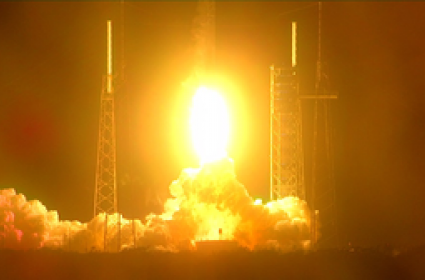New NASA satellite to study ocean, atmosphere lifts off on SpaceX rocket

Washington, Feb 8 (IANS) A new NASA climate mission to study ocean, atmosphere has successfully launched into orbit on Thursday aboard a SpaceX Falcon 9 rocket.
Known as PACE, short for, the Plankton, Aerosol, Climate, ocean Ecosystem satellite mission blasted off at 1:33 a.m. EST from Space Launch Complex 40 at Cape Canaveral Space Force Station in Florida.
NASA confirmed signal acquisition from the satellite about five minutes after launch, and the spacecraft is performing as expected.
“Congratulations to the PACE team on a successful launch. With this new addition to NASA’s fleet of Earth-observing satellites, PACE will help us learn, like never before, how particles in our atmosphere and our oceans can identify key factors impacting global warming,” said NASA Administrator Bill Nelson, in a statement.
“Observations and scientific research from PACE will profoundly advance our knowledge of the ocean’s role in the climate cycle,” added Karen St. Germain, director, Earth Science Division, Science Mission Directorate, at NASA Headquarters in Washington.
The PACE mission will study the impact of tiny, often invisible things: microscopic life in water and microscopic particles in the air.
The satellite’s hyperspectral ocean colour instrument will allow researchers to measure oceans and other waterbodies across a spectrum of ultraviolet, visible, and near-infrared light.
This will enable scientists to track the distribution of phytoplankton and -- for the first time from space -- identify which communities of these organisms are present on daily, global scales.
Scientists and coastal resource managers can use the data to help forecast the health of fisheries, track harmful algal blooms, and identify changes in the marine environment.
The spacecraft also carries two polarimeter instruments, Hyper-Angular Rainbow Polarimeter #2 and Spectro-polarimeter for Planetary Exploration.
These will detect how sunlight interacts with particles in the atmosphere, giving researchers new information on atmospheric aerosols and cloud properties, as well as air quality at local, regional, and global scales.
Disclaimer: This story has not been edited by the Sakshi Post team and is auto-generated from syndicated feed.



















